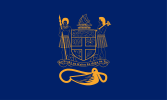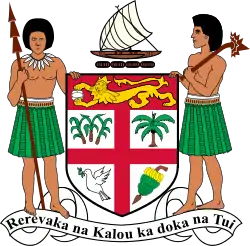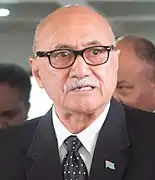President of Fiji
The president of the Republic of Fiji is the head of state of Fiji. The President is appointed by the Parliament of Fiji for a three-year term under the terms of the 2013 Constitution of Fiji.[1] Although not entirely a figurehead, the president's role in government is mostly ceremonial, but there are important reserve powers that may be exercised in the event of a crisis. In addition, the president is commander-in-chief of the military forces.
| President of the Republic of Fiji | |
|---|---|
 Presidential Standard | |
| Style | His Excellency (Informal) The Honorable (Informal) |
| Residence | Government House, Suva |
| Appointer | Parliament of Fiji |
| Term length | 3 years renewable once[1] |
| Inaugural holder | Penaia Ganilau |
| Formation | 5 December 1987 |
| Salary | FJ$ 130,000 annually[2] |
 |
|---|
| This article is part of a series on the politics and government of Fiji |
History of the office
The office of the president was established following two military coups in 1987 that led to the proclamation of a republic on 7 October, ending the Fijian monarchy. Major-General Sitiveni Rabuka, who had masterminded the coups, formed an interim military government with himself as its head. He did not, however, take the title of President, and on 5 December appointed Ratu Sir Penaia Ganilau, the last governor-general, as the first president of the republic.
A civilian putsch instigated by George Speight led to another constitutional upheaval in 2000. President Ratu Sir Kamisese Mara resigned on 29 May rather than abrogate the Constitution, as the military, supported by the Supreme Court, had asked. (Whether or not his resignation was forced was the subject of a police investigation that continued up to the time of the 2006 coup). Commodore Frank Bainimarama took power as the head of the interim military government (as had Rabuka in 1987), until Ratu Josefa Iloilo was appointed President on 13 July.
On 5 December 2006, the military forces again overthrew the government. Bainimarama declared himself acting president; he initially said that he had assumed the office in an interim capacity, and would soon ask the Great Council of Chiefs to reinstate Iloilo, but on 17 December he insisted that he was now the president and that the Great Council should recognise him as such.[3] Iloilo was re-instated as President on 4 January 2007.
In January 2008, Bainimarama stated that the military was "the executive authority in the appointment of the President", following the suspension of the Great Council of Chiefs. The president would be a military appointee, until a reformed GCC were installed.[4]
A few days later, Citizens Constitutional Forum director Reverend Akuila Yabaki suggested that the position of President should, in future, be open to persons of any ethnicity, rather than reserved for indigenous Fijians. This suggestion was controversial, and was notably opposed by deposed prime minister Laisenia Qarase. A Rewa chief, Ro Filipe Tuisawau, also opposed the idea, and stated his view on the function of the presidency:
- "The position of the president symbolises unity of both traditional structures of leadership which existed before parliamentary rule was established and the current Westminster system of parliament. This is where the Western system meets our traditional vanua system and we acknowledge the indigenous leadership that has evolved and catered for all races in our multicultural society. By nominating the President the nation is acknowledging the role our chiefs have played in society and I think the Fijian people would appreciate that the status quo stay."[5]
On 28 July 2009, Iloilo announced that he would be leaving office on 30 July.[6] Brigadier-General (Rtd) Ratu Epeli Nailatikau succeeded him as acting president. On 5 November 2009, Nailatikau was sworn in as President.[7]
In March 2012, the Bainimarama government disestablished the Great Council of Chiefs by decree.[8][9] Bainimarama confirmed this meant there would need to be a new method to appoint the president; this, he said, would be provided by a new Constitution, to be adopted in 2013 following consultations with the people.[10]
On 12 October 2015, the Parliament elected Major-General (Rtd) Jioji Konrote as President.[11] On 12 November 2015, Konrote was sworn in as President.[12]
Fiji's fourth constitution was signed into law by President Epeli Nailatikau in September 2013.It is the first to eliminate race-based electoral rolls, race-based seat quotas, district-based representation, the unelected upper chamber, and the role of the hereditary Council of Chiefs. It vests sole legislative authority in a one-chamber, 50-seat, at-large Parliament, to be first convened following general elections in 2014. on abrogation of the 1997 constitution).
 |
|---|
| This article is part of a series on the politics and government of Fiji |
Background
Fiji's first constitution, implemented in 1970 at the time of independence from the UK, contained negotiated provisions to enshrine the political supremacy of the minority indigenous population. When a majority Indo-Fijian government was elected despite these safeguards in 1987, Fiji's first two back-to-back coups took place, resulting in even tighter measures in the 1990 constitution.
Widespread Indo-Fijian dissent, coupled with a population shift back to an indigenous majority, prompted a more inclusive approach in the 1997 constitution. This was followed by the election of the first Indo-Fijian Prime Minister, and the violent, failed civilian coup of 2000.
Rationale
The 2000 coup was ended by military intervention, and power was handed over, after significant bloodshed, to a civilian administration. That administration subsequently won the 2001 elections — with backing from several elements that had been supportive of the coup — and granted early release to several conspirators who had been imprisoned. It also proposed legislation that would have extended a general amnesty to all involved (the Reconciliation, Tolerance, and Unity Bill).
This angered the head of the Royal Fiji Military Forces, Frank Bainimarama, who spoke out against the government, formally demanded a reversal, withstood an attempt to replace him, and eventually launched his own coup in December 2006.
As Prime Minister, Bainimarama declared that the race-based electoral system — which he saw as insulating the well-connected, not just from political consequences but from justice and the law — had to be reformed before new elections were held. After months of international pressure, he announced elections for 2009, but then reversed himself, saying that a whole new system (a new census, a new voter's list, and a new constitution) would need to be established to prevent a return to the "coup culture."
In 2010, the People's Charter for Change, Peace and Progress was unveiled, and consultations were held across the country to hear input from citizens on a new constitution.
Criticism
Original draft author Yash Ghai has publicly disagreed with changes in the final document, including the removal of regional representation, maintaining that it favors larger political parties.
List of presidents of Fiji (1987–Present)
References
- "Constitution of the Republic of Fiji" (PDF). 2013. Archived from the original (PDF) on 23 September 2015.
- Government of Fiji Gazette (3 October 2014). "PARLIAMENTARY REMUNERATIONS DECREE 2014 (DECREE NO. 29 OF 2014)" (PDF). www.parliament.gov.fj.
- http://www.fijilive.com/news/show/news/2006/12/18/Fijilive13.html
- "Voreqe: Army is executive authority" Archived 13 August 2012 at the Wayback Machine, Fiji Times, 2 January 2008
- "Keep President Fijian" Archived 23 February 2012 at the Wayback Machine, Robert Matau, Fiji Times, 7 January 2008
- President of military-led Fiji plans to step down, AP, 28 July 2009
- Nailatikau sworn in as Fiji's new President. News.xinhuanet.com (5 November 2009). Retrieved on 4 May 2012.
- "Fiji's Great Council of Chiefs abolished". Stuff. Retrieved 12 April 2018.
- "REMARKS BY THE PRIME MINISTER ON THE GREAT COUNCIL OF CHIEFS (GCC)" Archived 19 October 2012 at the Wayback Machine, government of Fiji
- "Fiji to have a new system to elect president", FijiVillage, 14 March 2012
- "Fiji Parliament elects new President". Radio New Zealand International. 12 October 2015. Retrieved 15 October 2015.
- "Fiji swears in new president". Radio New Zealand International. 12 November 2015. Retrieved 15 November 2015.
